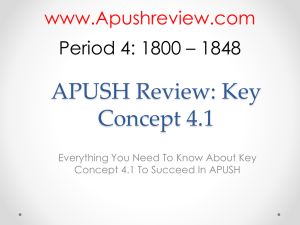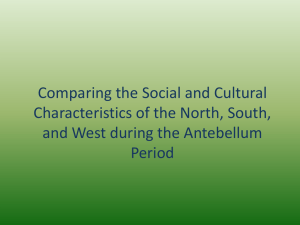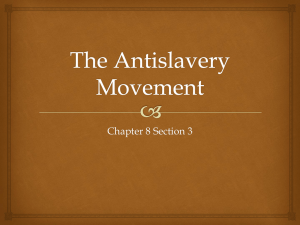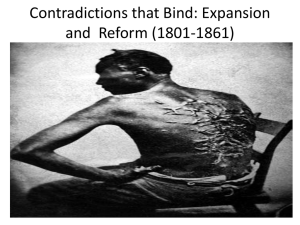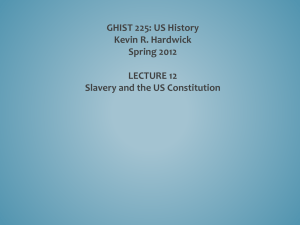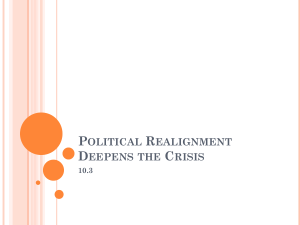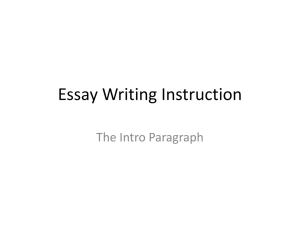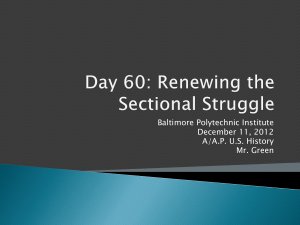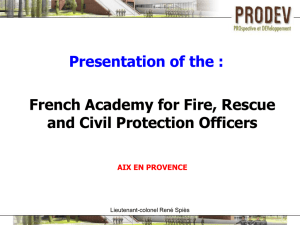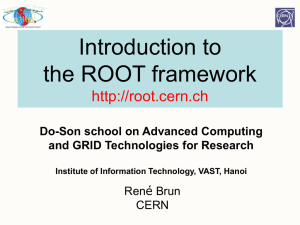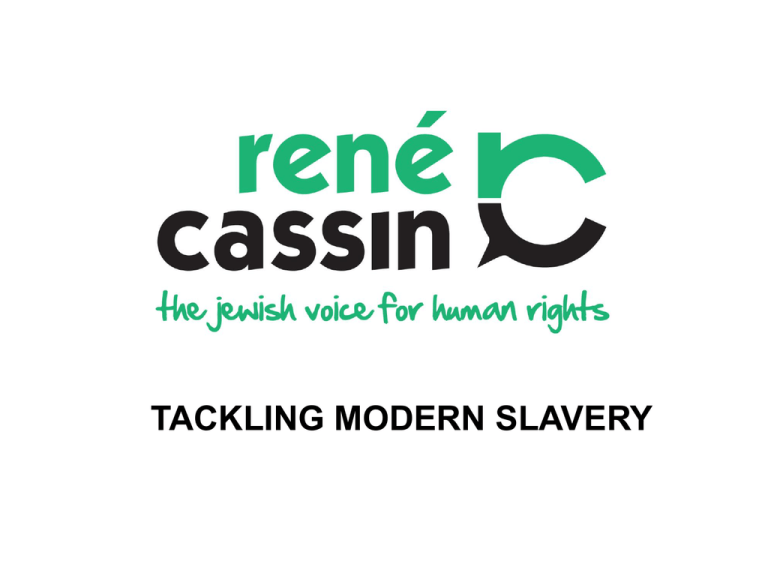
TACKLING MODERN SLAVERY
THE ESSENTIAL FACTS
Our Mission
•
René Cassin is a human rights charitable organisation that uses historical Jewish
experience and positive Jewish values to campaign and educate on universal human
rights issues such as discrimination, detention and genocide.
Who was René Cassin?
•
The organisation is named in honour of René Cassin, a French Jew and Nobel
Laureate who was one of the principal co-drafters of the Universal Declaration of
Human Rights.
René Cassin on the International Stage
•
Through the CCJO, René Cassin enjoys accreditation at the United Nations, and
interventions made by René Cassin are presented in CCJO's name. The organisation
uses this accreditation to vocalise Jewish values within the international human rights
community.
Recent Activities
René Cassin recently:
• co-founded and worked collaboratively with the Detention Forum to
campaign successfully to end child detention in the UK;
• worked in conjunction with the UK Government to provide input from
within the Jewish community on proposed human rights legislation.
Our input was well received by Parliamentarians and played an
important role in the campaign to retain the Human Rights Act; and
• produced the Detention Toolkit, which will empower aspiring activists
with the tools necessary to promote fair treatment of asylum seekers
in the UK.
Advocacy and Campaigns
•
René Cassin runs a campaign to challenge aspects of the policy concerning
detention of asylum seekers, including indefinite detention and detention of
vulnerable subjects.
•
We campaign to draw awareness to widespread discrimination occurring
throughout Europe against the Gypsy and Traveller communities.
•
René Cassin is involved in work to end slavery and collaborates with
organisations such as ATZUM to this end. We are also producing a
‘Haggadah resource’ which will empower supporters to actively engage in
and assist our campaign.
•
We will be continuing to maintain relationships with Parliamentarians and
officials in our four core policy areas so that we may offer a Jewish voice on
human rights issues.
Education and Training
• René Cassin offers a year-long Activist Enrichment
Programme (‘AEP’) to develop young professionals into
committed and knowledgeable human rights
campaigners.
• We also hold regular Human Rights Training Days, and
Human Rights Shabbatot.
• Our Rights Respecting Schools Project - targets school
students and is delivered in cooperation with the United
Nations Children’s Fund (‘UNICEF’).
Why You Should Get Involved
•
René Cassin is uniquely placed to educate and campaign on human rights
issues that other larger organisations are unable to effectively address.
•
Our organisation offers a range of educational programs, activities, events
and initiatives that provide participants with an understanding of
contemporary human rights issues and empower them to actively address
those issues both domestically and on an international level.
•
Through our relationship with the CCJO and the UN, we are also able to
offer our supporters an opportunity to liaise with high profile and
authoritative voices on human rights issues and to make a difference in
those areas which are the focus of our campaigns.
•
Finally, it is our duty as Jewish people to draw upon our historical
experience and values in the drive to promote and protect the human rights
of all people.
MODERN SLAVERY
Modern slaves are people who are:
Forced to work without pay
Under the threat of violence
and unable to walk away
Unlike slavery in the ancient world,
today’s slaves are not usually bought and
sold in public, and they are rarely held in
chains
1.5 billion people live on less than $1 a
day
Which means that modern slaves are
cheap, and can be easily replaced
What is slavery?
•
The illegal and forcible exploitation of people for little to no pay, bondage, deprivation
of the right to leave circumstances of virtual imprisonment, and being subject to the
control of another.
•
The concept of slavery, though age old, transcends time and conditions and slavery
continues to exist today.
•
Three trends supporting the huge rise in slavery today:
–
–
–
an exponential increase in the world’s population, primarily in the developing world;
accelerated urban growth, rapid social and economic change and an influx of an
agrarian population into urban city centres away from their traditional social support
network; and
government corruption and complicity in trafficking offenses.
•
These three factors have converged to create a hospitable climate for slaveholders.
•
While there are a host of international and national laws in place to combat slavery,
the reality is worrying: slaves are cheaper to have today than they were in the
colonial era in the American South.
•
People who are poor and desperate can be tricked into debt bondage or
may be captured and forced to work in houses, on farms, as soldiers or
even as prostitutes.
•
Slaves can be replaced easily when they are too ill or old to work as there
are many more people who can be tricked into working for nothing. Huge
profits are made by today’s slave holders.
The total yearly profit created by slaves
is around $14 billion.
In places like India and Nepal where
there is an unstable economy and mass
poverty, human slaves can cost just £10!
Different types of Slavery:
•
Modern slavery takes on many forms. The United Nations Office of the High
Commissioner for Human Rights has identified the following forms of slavery:
– chattel slavery, where the enslaver has complete power over the life and liberty
of the slave;
– debt bondage, where migrant workers used as forced labour as a form of
repayment for a loan;
– human trafficking, which involves transporting people away from their home
and coercing them into work via deception or violence;
– serfdom, where serfs labour under landowners in exchange for the right to work
on the fields of the landowners;
– child labour and servitude, where underage children are forced to work in
contravention of the law for little or no pay;
– forced labour, where people are illegally recruited to work under threat of
violence; and
– forced marriage, when women are forced into lives of indentured servitude and
live in fear of violence and aggression.
• Slavery is a fundamental violation of human
dignity
– Slavery isn’t limited to poor countries.
– There are many different types of situations that
amount to conditions of slavery.
– In Israel, there are a growing number of women from
Russia and the Ukraine who find themselves caught
up in sex work. This is an example of modern day
slavery in a developed country.
Child slavery case study
•
Shortly after Iqbal Masih was born in a small village in rural Pakistan, his
father abandoned the family. Iqbal's mother struggled to support her
children as a housecleaner, but could not. When he was four years old,
Iqbal was sold for $16 into bonded labour at a carpet factory. He worked 12
hours a day and was horribly undernourished and beaten by the foreman
many times.
•
Iqbal's story reflects the lives of over 200 million children around the world
who have been forced to give up school, sports, play and sometimes even
their families and homes to work under dangerous, harmful, and abusive
conditions.
•
Many children labourers work in dangerous or exploitative conditions. They
are often kidnapped, bought or forced to enter the sex market. As of 2004,
there were 218 million children working under slave conditions (Free The
Children).
People trafficking
• Occurs when individuals are taken away from
their homes to other areas where they are
forced to work.
• These workers lack the same rights as those
who inhabit the countries they have been
trafficked into.
• They have no protection from the law and are
forced to work illegally without being able to see
their friends and families.
“Oppressed people cannot remain oppressed forever. The yearning for freedom
eventually manifests itself. The Bible tells the thrilling story of how Moses
stood in Pharaoh’s court centuries ago and cried, ‘Let my people go.’ This is
a kind of opening chapter in a continuing story.”
Martin Luther King, Nobel Lecture 1964
Incorporating modern slavery into the Pesach Seder: Ma Nishtana
•
•
‘Why are we making tonight different?’
An important element of Ma Nishtana is that it affords us the freedom to ask. To encourage the
free flow of questions, some medieval Rabbis added new customs to their sederim. We should
emulate this by incorporating questions and facts about modern day slavery into our seder.
Coalition partners
• At René Cassin, a lot of our campaign work is carried out in coalition
with other non-governmental organisations operating in the
campaign area.
• For instance, we work collaboratively with the following
organisations in our work to tackle modern slavery:
Free the Slaves
Rabbis for Human Rights
Anti-Slavery International
Not for Sale Campaign
IAbolish
Atzum
How To Get Involved
• There are constant opportunities to contribute to René
Cassin’s work in a meaningful way. You may volunteer
on any one of our variety of campaigns and projects;
show support by attending our events; make a financial
contribution; or assist us in our fundraising activities.
• Please email Simone Abel at
simone.abel@renecassin.org a short statement about
your background and interests and she will be in touch to
discuss how you can become involved in the
organisation’s work.



